#ludonarrative dissonance
Explore tagged Tumblr posts
Text
I love it when farm animals in strategy games have their own little pockets of visibility in the fog of war, because the fog of war is ostensibly a visual abstraction of military intelligence-gathering, which implies that the goat is submitting intel reports.
19K notes
·
View notes
Text
“Keep him [Lucanis] away from Treviso. From the Crows!”
Me Ok.
Also me: *Returns to Treviso for side quest with Luc in my party*
Illario:

124 notes
·
View notes
Text
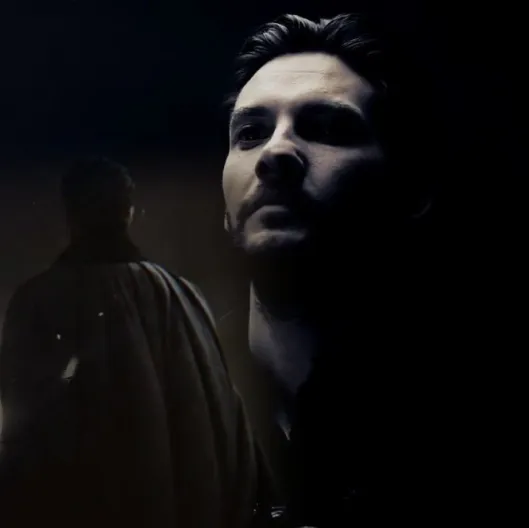
Ever since I watched Shadow and Bone, I couldn't shake the feeling that something was off. The narrative was telling me one thing, but what I was actually seeing - the choices the characters made, the consequences of their actions lacked logic. I had hoped that Season 2 would correct this, but instead, it only deepened the problem. It took me a while to realize that Alina’s and Aleksander’s actions fit perfectly into ludonarrative dissonance. The story insists that Alina is the hero, the one destined to bring balance, while Aleksander is framed as the villain, the force that must be stopped. But when I step back and actually analyze their decisions, the truth is far more complicated than the show allows. Alina’s journey is presented as noble and necessary. She struggles, she learns, and ultimately, she destroys the Fold, a moment meant to symbolize her triumph over darkness. But the world doesn’t work in such simple terms. The Fold, though dangerous, was also a shield, an unintentional barrier that kept Ravka’s enemies at bay. Removing it did not bring peace; it removed a layer of protection for the very people Aleksander had fought for. The consequences of her choice are massive, but the story never truly forces her to reckon with them. As for Aleksander the narrative insists that he is the villain, that his power is something to be feared, that he must be stopped. But everything he does has a purpose. He does not destroy for the sake of destruction. He is not a tyrant seeking power for power’s sake. He has spent centuries ensuring the survival of a people who, without him, would be hunted, persecuted, and erased. At its core, his fight is against the extermination of Grisha. He does not act out of blind ambition, but out of a clear and painful understanding of what happens when Grisha are left vulnerable. He builds, he leads, he prepares for a future that others refuse to see. This is where the dissonance becomes impossible to ignore. The story portrays Aleksander’s strength as dangerous, while Alina’s is righteous, even though she wields the exact same kind of power. His methods are condemned, while hers are forgiven, even when her choices lead to instability. The story insists on reducing Aleksander to a villain, but when I look at him, I see a man carrying the weight of centuries, a man who has loved and lost, a man who understands that survival is not guaranteed butit has to be fought for. Alina does what she believes is right, and her heart is in the right place. But the story refuses to acknowledge that Aleksander, too, acts out of necessity, out of love for his people, out of a relentless drive to build a future where Grisha are no longer at the mercy of kings and armies. What frustrates me is how the story insists on simplifying something that is not simple. It tells me that Alina is light and Aleksander is darkness, when in reality, they are both so much more. They are two people carrying impossible burdens, two people who could have stood together but were torn apart by forces greater than themselves. And that is the real tragedy—not that Aleksander needed to be stopped, but that no one truly listened to him.
#shadow and bone#shadow and bone tv#aleksander morozova#pro darkling#darkling#alina starkov#the darkling#ben barnes#darklina#sun summoner#shadow summoner#ludonarrative dissonance#shadow and bone netflix#darkling deserves better#morally grey men#morally grey characters
45 notes
·
View notes
Text
Being a Logistically and Materially Sound post-apocalypse has never been one of Fallout's goals, even going back to the Interplay games. It's fun to look at Fallout with a "wait how would this work in the real world" lens (I did this when figuring out how much fuel a vertibird would need if it were crossing North America, also for research into much work would be needed to recover irradiated soil vs the "plants fruit 3 days after planting!" Fallout 4 gardening system, because I was curious about figuring those things out) but sometimes I think it's useful to remember that this is also the game series where aliens and a dude that became a tree is canon. Sometimes you gotta throw your hands up and be like "yeah this universe contains 0% realism sometimes and it's fine". Nobody ever asks about the veracity and logistic possibility of the Prydwen or Robobrains or aliens with pew pew guns or disembodied talking brains floating in formaldehyde because we can all suspend disbelief for those things, but point at the Unrealism of the Armoured Exoskeleton which is like. One of the more plausible aspects of this entire game series and the crowd goes wild. People approach me to consult about Fallout worldbuilding for their mod and fanfic writing and even as the "here's how I would think this Fallout Thing would work in the real world" person even I'm like "yeah sure go figure it out if you want but it's ok if you don't, not everything needs an answer"
As a greater critique of Gaming CritiqueTM, I think ludonarrative issues in games is a fascinating topic, but I also think ludonarrative dissonance is a term that's often misunderstood & misused to illustrate someone's dislike of a mechanic or whatever, rather than being accurately used to describe moments where ludonarrative issues are happening. I'm gonna say that staring at an empty power armour shell and saying "but WHERE'S my TEAM OF ENGINEERS and MILITARY-INDUSTRIAL COMPLEX and IS THE STEEL HAND-POURED OR RECYCLED" isn't one. Something not having an answer in-universe doesn't make it a ludonarrative problem! It's just an unanswered detail! Like sometimes video games can't be built to address every plausible explanation for every possible worldbuilding question the player's gonna come up with; this makes worse media when creators start trying to stay ahead of fans like that. Also, fuck, there are fanfic writers who have written stories about the Brotherhood of Steel that has plausible logistics/resources planned out. It's ok that the answer isn't contained in the game with a neat lil bow on top u feel me
#fallout meta#fallout#fallout 4#worldbuilding#ludonarrative dissonance#I've had my own fun & frustrations with asking & answering hard q's about in-universe stuff! Don't get me wrong!#but power armour is ultimately small potatoes compared to like. the prydwen. or robobrains!?#I'm not posting this to vaguepost. I have been told it's better to make one's own post instead of disagreeing in the rb's#I'd rather not cause someone to feel like they've been attacked on their post#no one wants the 'uhhmm excuse me I have 3.5 degrees in Topic' person to come along and be smug at them#I have critiques of the critique as I've seen (& written!) posts with this kind of critique#I also know OP was not saying power armour is a ludonarrative problem; I'm making a greater critique because the word came up#and I've been chewing on similar thoughts about Gaming CritiqueTM for a while
25 notes
·
View notes
Text
Watch_Dogs 2 is the poster child for Ludonarrative Dissonance.
I think the reason I bounced off Watch_Dogs 2 but loved Watch_Dogs 1 is because in Watch_Dogs 1 you play a criminal but in Watch_Dogs 2 you play a terrorist. Like... 2 dresses it up as being a scrappy gang of young punk freedom fighters sticking it to The Man, but the game also has a mission where you can butcher an entire film crew because they made movie that offended your organization's beliefs, but its cool because the mission has the talking Knight Rider car! Like I don't care how you dress it up, that's terrorism! You are using violence to intimidate the populace into not opposing you or your beliefs openly. How is that NOT terrorism?
Aiden Pearce causes just as much damage as DeadSec, but he is always doing it for purely selfish reasons. He's a morally grey antihero who is using vigilantism to cope with being unable to protect the ones he loved. He doesn't have a cause, he doesn't have a message. He's a criminal. Nothing more. I can enjoy playing a game as a criminal - you could not make a game where I would enjoy playing as a terrorist.
#ludonarrative dissonance#watch dogs#watch dogs 2#aiden pearce#video games#ubisoft#gameplay#game design
11 notes
·
View notes
Text
fighting majima in yakuza kiwami is a prime example of ludonarrative dissonance because even though the game mechanics are combat based, they are actually having passionanate & thorough gay sex
#kazumaji#yakuza kiwami#ludonarrative dissonance#is that a term that people recognize#if not then i suppose the video essayists are doing it all for nothing...
263 notes
·
View notes
Text
What do Rick Sanchez, Don Quixote, and Harry Du Bois Have in Common?
In all three of these stories, these characters are ‘self-aware’ in that they intentionally play into the tropes of the stories they’re satirizing (Rick Sanchez satirizing sitcoms, Don Quixote satirizing chivalric romances, and Harry Dubois satirizing roleplaying games). However, the trick to their ‘self-awareness’ is that they’re lying to themselves.
This post is LONG, so feel free to skip to the end if you're just interested in "The Self-Aware Player of Harry Du Bois" (in bolded green) if you don't feel like reading the rest of the analysis. I go into the meaning of the political vision quests, the meaning of the 4th wall breaking RPG elements like copotypes and Jamrock Shuffling, and the effect this has on the player's relationship to Harry Du Bois!
(Common) Rick Sanchez (L)
Although Rick acts like he can see the audience and uses marketable catchphrases like “Wubbalubbadubdub” to appeal to sitcom sensibilities (“Bazinga;” “Did I do that?” “Legen- Wait For It -Dary;” etc.), the truth of the matter is that WITHIN HIS REALITY, he is not a sitcom character.
He truly does not know he’s in a sitcom.
He’s just an asshole.
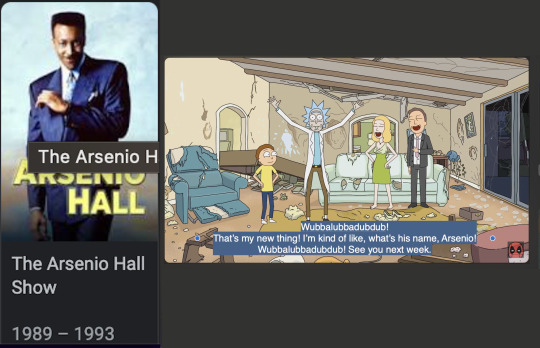
ID A screenshot from the show Rick and Morty, with subtitled dialogue that says: Wubbalubbadubdub! That's my new thing! I'm kind of like, what's his name, Arsenio! Wubbalubbadubdub! See you next week. Beside the screenshot is a picture of the mentioned Arsenio, who is the titular character to a sitcom called The Arsenio Hall Show End ID
Rick has ATROCIOUS main character syndrome. Truly obnoxious. We happen to be enjoying (debate-able) it from our TV screens, but he doesn’t know that! Hoe’s just calling his family ‘side characters’ and taking them on traumatizing ‘B plot’ adventures to humor-cope with his multiverse induced nihilism. (it is NOT WORKING)
Dan Harmon, as a big fan of the storytelling theory behind sitcoms, has a thing for these type of self-aware-but-not-really characters in his shows. Abed (from his other well-known sitcom named ‘Community') is basically a film student obsessed with film tropes—
Which means he’s eternally making meta self-aware quips on the show without actually being self-aware. He’s not Deadpool, he's just a movie nerd.
It's a wink and a nod to show the audience, Hey, we’re aware that nowadays people are savvy enough to comment on when they’re in a wacky sitcom plot.
This is ‘some looney tunes type shit,’ amirite guys?
(This trick is called lampshading, it got popular recently with Marvel movies and the influence of Joss Whedon's writing (@dingdongyouarewrong), but it's also going through a bit of cliche fatigue right now. "That happened" jokes are an example that I know so many people are sick of, partly because it feels like writers include self-awareness/lampshading as a shield from criticism by pretending you can't critique a problem they're self-aware about!
Let me highlight it to you in the rest of this essay as a tool in satire/pastiche.)
'Donkey Hotel' (according to my speech to text)
To explain Donkey Hotel's deal, I must remark: This guy is on some ancient mental illness type beat.
Now, in the ancient era of Hippocrates, there used to be the hot idea that there are four major human temperaments, and these temperaments are influenced by the balances of liquids in our body called humors. And that an imbalance of the four would lead to an over representing of a temperament.
Don Quixote had a 'Choleric' temperament, which is an overrepresentation of yellow bile and characterized with qualities such as 'hot and dry' and emotional irregularities such as increased anger or behaving irrationally. That's our knight!
Now obviously we know that the idea of 4 Humors in our body controlling our temperament is a BS simplification of mental health, BUT, there’s usually a kernel of truth in ancient theories. The universe really was made up of elements like Aristotle theorized, just not the fire, earth, water, air that he thought they were.
Similarly, our author our man, Cervantes, was using the 4 Humors more to develop a physical/biological explanation to Don's mental illness.
All this to say, Don Quixote is currently deluding himself into believing he is a gallant knight, off to defend the honor of his lady love, the total paragon of a chivalric romance novel because, and I quote, “he became so absorbed in his books that he spent his nights from sunset to sunrise, and his days from dawn to dark, poring over them; and what with little sleep and much reading his brains got so dry that he lost his wits.”
Let's pause.
An escapist stupor that completely wiped the mind of its host?
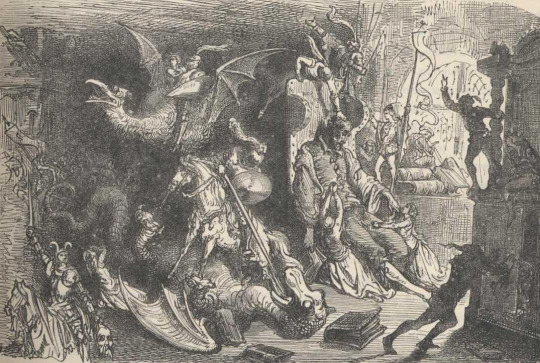
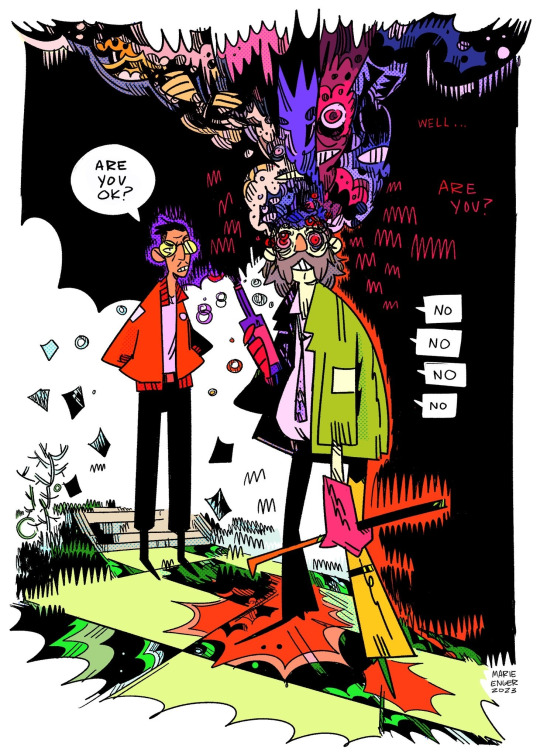
(FANART BY @so-engery! Check them out!)
ID Two images. One is is Gustave Dore's "Don Quixote Dreaming" drawing. The other is Disco Elysium fanart by Marie Enger @so-engery. Both showcase the main character of their respective works, slumped and surrounded by mad figments of their imagination, highlighting the parallels between the two. Harry with his Skill voices and Don with knights and fairytale creatures. End ID.
That’s our boy, Harrier Du Bois right there!
And while obviously Harry's condition at the start of Disco Elysium is more based on modern understanding of psychology (aka alcohol did it to him, not intense insomnia and a chivalric romance bookathon), it’s real neat we get this this little parallel before we even dig into Harry!
Now, with that neat explanation of why he’s self-aware out of the way, Don Quixote’s deal: Again, he’s not actually self-aware, he’s quite possibly the opposite of self-aware, and EVERYBODY (even the audience!) knows it. He’s only self aware in the sense that he’s acting like a character in a fictional story, which he is, but he’s got the wrong genre.
He thinks he’s in an action/romance, but he’s actually in real life—A satire of the action/romance genre!
Well, caveat.
Is Don Donning the 'Don' Inspirationally or is he Donning the 'Don' to Act as a Don About the Downs of Chivalry?
I read it as Don Quixote donning the 'don' title to act as a don at the college of 'please touch grass and stop romanticizing romantic chivalry.'
A super popular adaptational take, however, is to read him like he's an inspirational dreamer held back by a harsh reality.
Big Nate's Book Reviews on YouTube did a sweet review that highlights this perspective, along with his lil doobie,

that Don Quixote's perspective brings fresh child-like imagination and fantasy to the mundanity of the lives of the people around him. Nate says that Don Quixote and Sancho are "Truly the homies;" they're the first times he's ever felt that he could "find friends in characters in a book."
So there's definitely a joy and a message to the dreamer reading! BUT I tend to be a bit cynical about this, like it can feel a bit too similar to USAmerican Exceptionalism to me.
To clarify what I mean, let's do a Rick parallel.
Don Quixote, as a character, is more similar to the FANS of Rick and Morty than he is to Rick. (Which is its own commentary about how little we have progressed as a society since this book was published like 400 years ago, but also the way media is influenced by prior media.)
To explain THAT, lemme first say that there’s a sort of meta irony (which is how I describe this phenomena according to J-Reg’s theory of satire, but I don’t know the actual name of this) in the ‘he’s just like me fr’ guys. ‘Literally me’ guys. Guys who pseudo imitate Patrick Bateman, literally any Ryan gosling character, etc.

ID A youtube screenshot of 3 different videos titled "literally me" "Literally Me" or "Literally me (I'm mentally insane)" with different Ryan Reynolds characters as the thumbnail. In the "I'm mentally insane" video description, one of the tags is the word "sigma." End ID
Often these characters are meant to be made fun of as parodies of another trope, like Don Quixote is to a chivalric romance protagonist, but there’s a certain subset of the audience that is either too dumb to get it or just doesn’t have the context or background to get it.
Like the dudes who watch fight club, and just end up making fight clubs of their own. Or the way people misinterpreted Bruce Springsteen’s ‘Born in the USA’ as celebrating the US, instead of its true message of lambasting the US for its hypocritical treatment of its veterans. Or the glorification of Rorschach from Watchmen despite him basically being a MAGA. Or the way USAmericans didn’t get Starship Troopers because it was a parody of US military fascism.
There are tons of examples of these because of satire usually says more about the reader/viewer than it does about the author, like a Rorschach test (he really is aptly named). (And it’s why it’s more often fascists/conservatives wildly misinterpreting leftist media. People are more likely to come with a conservative perspective than vice versa bc conservatism is, by its definition, the norm. Though this does still happen on more progressive sides e.g. TJLC.) They didn't see or chose not to see the irony.
Cue the Reddit dudebros misinterpreting Disco Elysium as pro centrist or “all ideologies are equally bad" and the INSANE 'you have to have a high IQ...' 'rick is good and objectively correct' Rick and Morty fans.
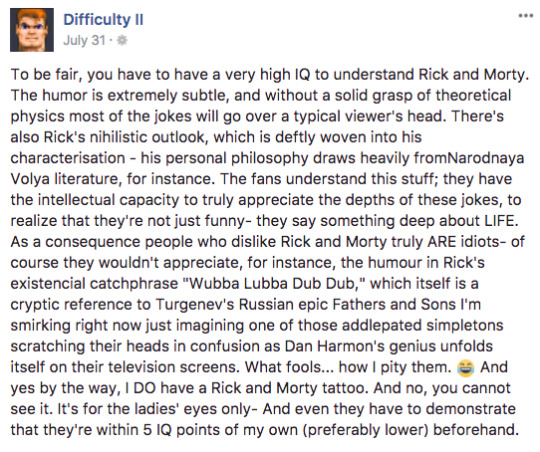

ID Two screenshots. One of the infamous "To Be Fair, You Have To Have a Very High IQ to Understand Rick and Morty" copypasta. One of a Disco Elysium Reddit post titled "Disco Elysium is Not Politically In Favor Of Any Ideology." End ID
Speaking of Rick and Morty fans, this is what I mean by the idea that Don Quixote is more like Rick's fans than he is like Rick. Much like the way Don un-self-aware-ly misinterprets his satirical reality for the chivalric romance of his favorite novels, so too do Rick and Morty fans un-self-aware-ly misinterpret Rick's nihilist satire on the sitcom for what is cool and good to do in real life. Plus, I can totally see these type of dudes unironically saying "Milady" to keep chivalry alive. But, there's one level further to this, beyond even seeing the irony, which I call the 'he's just like me fr' guys.
Now, in the case of the 'he's just like me fr' guys, it's not that they're mistaking the satire for sincerity—they totally understand that Patrick Bateman is a satirical take on Yuppie 'grind till you make it alpha' culture.
They're doing a secret third thing—meta irony—where they understand that Patrick Bateman is meant to be bad but act like they're un-self-aware and missed the irony anyway.
It's supposed to be a joke, buuuuut it's a joke the same way people will say "SLAY!" as a joke until it's unironically a part of their vocabulary. The ambiguity is key.
I'd argue that the dreamer Quixote approach is an application of 'he's just like me fr' view to Don Quixote, where he's 'a Chad rejecting reality in favor of the perseverance of man's whimsy' to some people, even as they joke that he's delusional ("Literally me (I'm mentally insane)").
Don Quixote certainly isn't doing it on purpose—again, he's un-self-aware, and he even got bullied out of it in part 2 (which admittedly I haven't read). Yet, there's a genuine sadness there of a man with such a penchant for adventure getting bullied that makes you wanna start humoring him.
It's ironic but not: Meta irony.
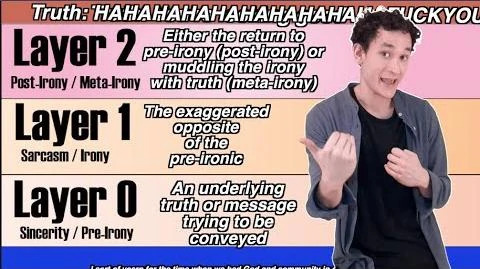
ID A screenshot of Jreg's "Post-Irony, Meta-Irony, and Post-Truth Satire (Video)" thumbnail. End ID
But yeah, meta irony is all fine and dandy when it's about slaying, but when it's about emulating the patriarchal psychopath, Patrick Bateman, or using edge-y humor to spread alt-right talking points, you start to wonder if there can be something insidious to the 'he's just like me fr' approach.
To put it best, the wild popularity of the Dreamer Don Quixote interpretation feels like the result of USAmerican 'grind till you make it' 'individual exceptionalism' 'it would suck for you, but i'm built different' values distorting the absurdity of being a reality denying dreamer, the same way we struggle to understand the Starship Troopers because it just feels normal/celebratory to us.
Don Quixote
So I think Don Quixote resonates strongest, for me, in the way it boldly states that reality is beautiful and worth living in without needing the opium of escapist fantasy.
For one, Cervantes is a rare ye olden feminist king who takes the time to point out that one man's escapist chivalric masculine fantasy is another woman's misogynistic reality.
To demonstrate, he has many examples of female characters telling off men for projecting romantic fantasies on them, but a more relevant way is how he writes Don Quixote as literally renaming some random woman he's never met 'Dulcinea' because he's decided she is his Lady he's given his eternal servitude to.
He renames her Dulcinea because it's "a name, to his mind, musical, uncommon, and significant, like all those he had already bestowed upon himself and the things belonging to him."
Which is PEAK satire of the misogynistic objectification of chivalry. If only the Rick and Morty "Milady" stans had the self-awareness this book had 400 years ago.
(Sidebar, but does anybody else think Don Quixote would make an absolutely killer Drag King persona? Don Queerote... Plus the ballet about him would help with the pre-existing choreo/music. Just a thought!)
But on another level, Don Quixote is full of interesting characters or stories outside of the chivalric knight conceit!
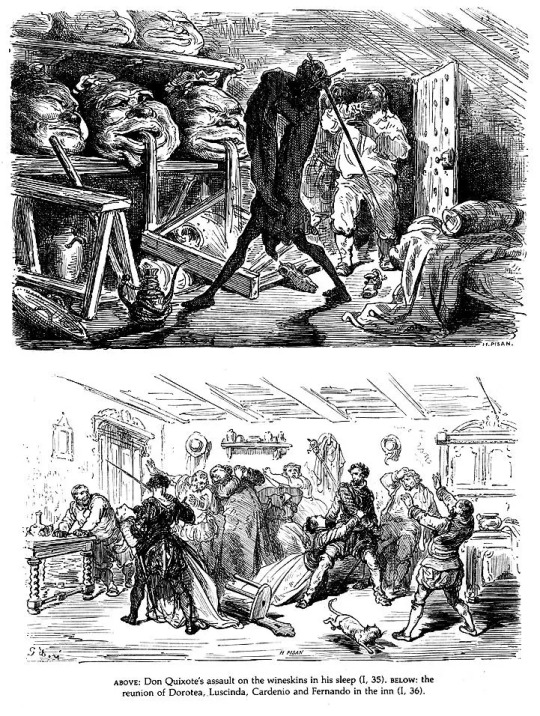
ID Pen illustrations (aka engravings by Gustave Dore) of two events happening simultaneously at the same inn in Don Quixote. The one above is of Don's assault on the wineskins in his sleep. The one below is of the reunion of Dorotea, Luscinda, Cardenio, and Fernando in the inn. End ID
People often clown on the novel for having so much time dedicated to the soap opera antics of side characters totally unrelated to the knight plot, but their antics being outside of Quixote's chivalric view emphasizes how life is interesting even when you're not following a delusional knight lifestyle!
Romance and reunions and betrayals that Don never really understands because he's too busy fighting windmills and wineskins! Yes, the delusion allowed him to go out and explore the world, but there's something so silly and sad about missing whimsy of real life in favor of living in escapist Knight Fanfiction. Reading about Cervantes's soap-opera-worthy life only reinforces this whimsy for reality and touching grass.
The Self-Aware Player of Harry Du Bois
Preface: My main experience is JRPGs, not so much other Western RPGs and tabletop games. So although I’m saying it’s a satire of these tropes, and I noticed a lot of these things as ‘satire’ and 'parody,' I’m not totally enmeshed in the subculture the creators were going for, so I might need some corrections.
Finally, this transitions into the deal with Harry! It's fascinating to me to think about how satire is used as the 'touch grass' or 'be fucking for real' genre. Oftentimes it's making fun of tropes/conventions by humorously contrasting them with reality—so how does this play out with the RPG!?
Weeellll, it goes hand in hand with the idea of RPGs as escapist power fantasy. RPGs are often thought of as the ultimate self-insert fantasy by its detractors or worst players, ahem looking at all those DND horror stories about entitled mangsty murderhobos.
One of the most infamous criticisms of Disco Elysium is its lackluster combat.
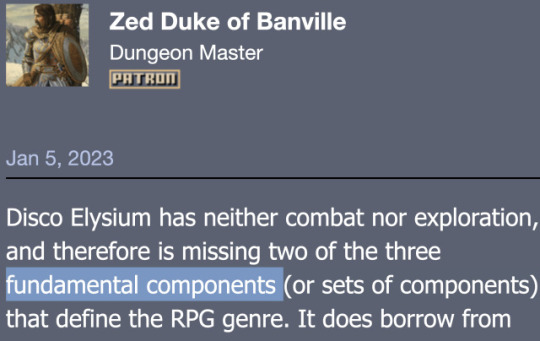
ID A screenshot of a random forum discussion post by dungeon master Zed Duke of Banville. It reads: "Disco Elysium has neither combat nor exploration, and therefore is missing two of the three fundamental components (or sets of components) that define the RPG genre." End ID
The game has essentially bordered off your ability to make Harry into a power fantasy murderhobo because you just are physically unable to equip an longsword or cuisse to murder your average citizen on the street of Martinaise.
But even on a less mangsty level, it subverts a lot of the basic expectations of RPGs.
Like the encounter with the racist lorry driver! You never get the ability or quest to change his mind, you only choose how you react to him.
Where other RPGs might let you act as the white savior or the white knight of chivalric romance, no questions asked, you're changing the minds of everybody who's wrong so we can all get along, Disco Elysium really makes you confront your ability to whiteknight, makes you confront if whiteknighting is even helpful, and why you wanted to whiteknight in the first place.
It’s part of the fun/humor experience of Disco Elysium that you at first expect to solve the world’s problems with a couple quests and lines of ‘good’ dialogue and then get socked in the faced with the fact that yeah, you can’t do much, you’re one person, what did you expect, asshole? Cuno doesn't fucking care!
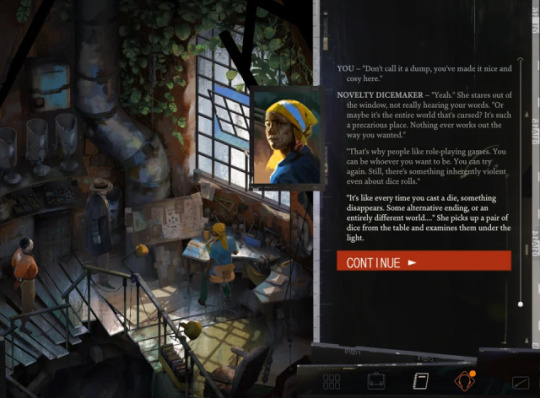
ID a screenshot of Disco Elysium dialogue YOU - "Don't call it a dump, you've made it nice and cosy here." NOVELTY DICEMAKER - "Yeah." She stares out of the window, not really hearing your words. "Or maybe it's the entire world that's cursed? It's such a precarious place. Nothing ever works out the way you wanted." "That's why people like role-playing games. You can be whoever you want to be. You can try again. Still, there's something inherently violent even about dice rolls." "It's like every time you cast a die, something disappears. Some alternative ending, or an entirely different world...." She picks up a pair of dice from the table and examines them under the light. End ID
Like, Neha is highlighting this little meta element of how you can stack your Harry in any RPG to pursue a certain ending or situation, but the actual outcome is still influenced by a dice roll out of your control.
A lot of the satirical humor in Disco Elysium comes from the absurdity that you can do everything right or everything wrong, and the dice can still fuck it up or save it for you—not just for things like high-fantasy attacks, but mundane things like remembering your name.
The dice are, at their core, about how RPGs aren't just for the control fantasy, of winning high-fantasy battles, but also can represent life as it is, mundane and uncontrollable.
Similarly, Harry is clearly written—complete with all the 'lore' that this would entail—to couch his RPG protagonist nature in the real.
If RPG characters are blank slates? Let's give ours amnesia! Need fast travel?! Kim teases the 41st Precinct for constantly running everywhere by calling it the Jamrock Shuffle. He needs to have deep and intimate conversations with everyone, even when they're strangers? Yeah, that's so weird we gave him the name 'Human Can-Opener,' and everybody remarks on his uncanny manipulation skills.
It's commenting on difference between controlling an RPG avatar and navigating in a human body.
As Kurvits said: “In reality we do not have control, or complete control, of our minds. Just like our body, it is something that we give-not even commands wishes to, and we hope it's gonna do it. We hope it's not gonna break down, we hope it's not gonna rebel against us.”
In one type of RPG fantasy, we don't even question our total control and even assume the joy is from the control. But in Disco Elysium, we lack control and find joy in it anyway. That is the fun of the game making us, the players, 'self-aware' about its RPG elements, and it especially resonates with anybody not able-bodied, anybody neurodivergent.
Harry Du Bois and Self-Awareness: Copotypes? More like Cope-otypes.
So that's on Disco Elysium and being aware of RPG elements in general, but let's deep dive into Harry and his Copotypes and political alignments like the OP!
I kind of want to round this last one out with what this all means. WHY am I, and others, linking self-awareness and satire? What's the link here?
Irony is one of the major tools of satirical writing, and there's always a little irony in being self-aware and doing it anyway, I think. It's specifically that Meta-Ironic element/Lampshading that is so rich for Touch-Grass satire because it parallels the futility/irony of self-awareness in real life.
The copotypes work this way.

ID A screenshot of a youtube comment. @jbeast3385 "Harry fundamentally takes on extreme interpretations of every ideology in the game as a coping mechanism for the tragedy that is his life, and it's amazing to see the amount of care given to extending an understanding of why each ideology appeals to his fractured mind. Each quest makes him something of a Don Quixote, searching for a purer purpose through political thought, failing spectacularly with it, but still fundamentally developing him and inspiring others beside him." End ID
The copotypes and the political alignments are a parody of classes and moral alignments. Rather than being a knight or a wizard, you're a superstarcop or a sorrycop! They don't do much, like there are no fireballs for an art cop, but they do poke fun at the ways the player is choosing to play Harry! Instead of chaotic good or neutral evil, you can be a communard or an ultralib! Which both involve spouting hilariously inappropriate talking points to the other citizens of Revachol.
What's fascinating, as @fagcrisis of this post says, is that these alignments are statements of how your Harry copes with the real world and the past/how he justifies what he does.
From the Solution to the Boring Cop Thought:
When someone says something political, the first three thoughts in your head are a ludicrous hodgepodge of communism, fascism and stock tips. When they ask you why you did something, it's superstardom, apocalypse, or the *mea culpas* of a flagellant cop monk
You start off making some choices based on the limited dialogue options of Harry's bizarre personality. If you play it like any other RPG power fantasy, BAM, the game hits you with the "Regular Law Official" thought, and you're labeled "Boring Cop." Or if you're apologizing to get the 'good' route, BAM, the game hits you with the "Rigorous Self-Critique" thought, and you're labelled "Sorry Cop!"
The game makes you 'aware' of your playing style, a little poke to say 'Stop being so scared of failures! You're boring! Sorry is not enough! Stop trying to be 'lawful good' (ACAB) and be a human!'
From the same Solution:
It's not easy, reaching for the fourth option -- the normal one. But you have. And now you're not *just* crazy, you're also *boring*.
Some people get this taste of self-awareness and fully embrace diving into the deep end of the game—Disco baby! Others lean into the sorry/boring/moralist cop in an ironic 'self-aware' sort of way—like the technique of Lampshading, since we're our own writers as RPG players.
But on a Harry level, it's also about HIM becoming self-aware of his habits, of internalizing these thoughts about his actions, his past, his coping mechanisms.
Seeking either “sweet oblivion” or to become “a different kind of animal,” many of the possible roleplaying choices are rooted in his desire to forget, evade or reframe the past. Whether self-destruction through drug abuse, fantasies of superstardom or visions of impending doom; it’s all in the service of not wanting to face the past, and the disastrous effects Harry’s continuous failure to do so has had on his life. - Vice
As the @fagcrisis of this post noted, Dora pretty much ALWAYS mentions the way Harry escapes reality by thinking of himself as an archetype, like other people are NPCs in an RPG. "like hes a self aware character but in the shitty way where him knowing he is a character and him acting like it only makes it worse because there isnt a story to escape from, he just cant cope with the real world" He's pulling a meta-ironic ''he's just like me fr" with Guillaume Le Million (who hangs himself) and superstardom the way "he's just like me fr" guys do it for Ryan Gosling.
And each copotype and political alignment are an opportunity to satirically critique the flaws and failures of each coping mechanism.
Cope-otype: Fascism
"Fascism, being marked, according to Paxton, by a need to compensate for humiliation, promises easy solutions to someone like Harry. It’s a crutch to prop up threatened masculinity, a rhetoric to shift blame for personal failings to ominous outside forces." - Vice
This game's satirical take on fascism is sort of perfect, literally making it about the lower intestines, 'gut instinct,' and bullshit (@spilledkaleidoscope). To be frank, fascists are 'full of shit,' and the vision quest highlights the way fascism isn't about a coherent ideology like 'returning to the past,' but rather it's a hodgepodge of SHIT thrown together to prop up hurt ego, threatened masculinity, of giving an easy scape-goated answer to the question of how Harry's supposed to face his past and his future.
The answer? He shoots it.
It's accurate in a way that doesn't reinforce the 'cool' aesthetics and pageantry fascism is obsessed with, what with literally calling fascists full of shit and all. Kim notices your change in expression, your stoic 'noble suffering' fascist face, and immediately calls it constipated. Bless.
Yet, even as Kim calls you out, even as you're aware of fascism's failures, how it destroys you ala Harry Du Bois -> Detective Raphaël Ambrosius Costeau, Fascist!Harry still believes because he can't face a wounded ego.
Cope-otype: Ultralib
Ultralibs on the other hand? I think it's telling that Idiot Doom Spiral is basically ultralib Harry's foil and a major questline NPC—the one who gives you Tequila Sunset.
Even the names are foils. Idiot Doom Spiral names himself that way to romanticize it, to make it into a marketable story, "but it keeps him in this state too, like a vicious cycle. The name ‘George’ is a name that still connects him to humanity," while Idiot Doom Spiral is a way to 'accept his place' even though it's miserable and keeps him from doing something about it, nor connect with other people, as @kindaeccentric put it in this post.
Similarly, the megarich light bending guy in the UltraLib quest LITERALLY is much more unlikely to connect with poorer people because the Rougon-Macquart coefficient literally dictates that we cannot see the richest people because their networth bends the light around them. It's an inversion of the way rich people are ignorant to poverty in real life, and here's a really good fic that covers this coefficient!
Finally, this mirrors Tequila Sunset as a name as well, the way it's a cope for hating himself. Instead of being miserable, he glorifies his misery by calling himself a funky, disco drink name, even as it symbolizes being washed up or even symbolizes the pale swallowing all, depending on how you play him (@palin-tropos).
So much of the ultralib plotline is about adding value — whether by sprucing yourself up with a new name like Tequila or Idiot or by 're-conceptualization' — through stuff like grind/hustle culture. An obsession with increasing networth but also 'giving back' to the community, as philanthropists put it.
But the satire of the ultralib vision quest is highlighting how hollow 'adding value' is, how much of it's just competition for wealth for the sake of wealth with no real meaningful answer or value.
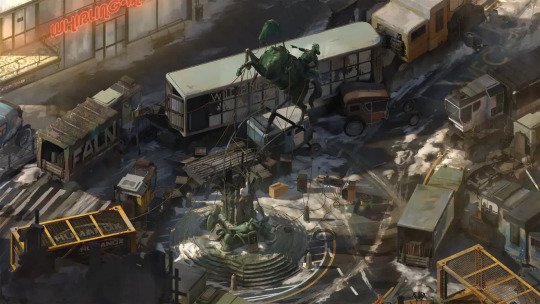
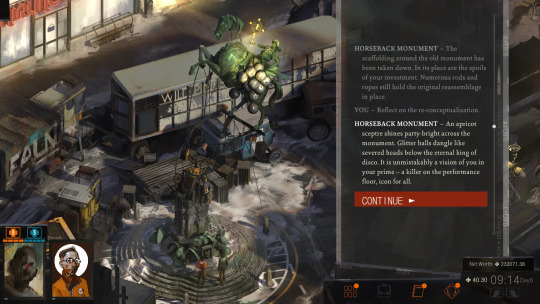
ID Two screenshots of the game Disco Elysium. The first is of the horseback monument as it is. A matrix of cables and ropes isolate the fragmented bits in thin air. The second is described as this through in-game dialogue: HORSEBACK MONUMENT - The scaffolding around the old monument has been taken down, In its place are the spoils of your investment. Numerous rods and ropes still hold the original reassemblage in place. YOU- Reflect on the re-conceptualization. HORSEBACK MONUMENT - An apricot sceptre shines party-bright across the monument. Glitter balls dangle like severed heads below the eternal king of disco. It is unmistakably a vision of you in your prime -- a killer on the performance floor, icon for all. End ID
It's 'reconceptualizing' the Horseback Monument — the symbol of both the bombing of the revolution and the enduring of spirit the communards anyways, the way they've built a monument to freeze in time the moment of the profligate king being blown up — by building it in your own image. The fact that to do so you need to exploit the labor of an artist so you can make a profit, and it doesn't truly 'give back' to the community in any way. In fact, it's almost the opposite, like you've ruined the community monument by painting yourself AS THE KING.
It's why even Harry admits that "You're just insane, insane and gone. Even six billion won't fix you if she’s not there." Each copotype and political ideology contends with their own version of this as Harry learns to grow and face his past head on.
The Marriage of Fictional Conventions and Real Human Psychology
In the end, you can't just lean into an ideology or an archetype and hope that it'll answer all you problems.
But more than that — being self-aware about your issues doesn't solve anything either, no more than lampshading "fixes" any problems with your TV show.
It is this parallel between what Harry learns as he progresses and what the player learns as they progress that makes us empathize/resonate with Harry.
From acting erratically, then realizing it's part of an ideology, self-awarely adopting an ideology, to seeing how it fails and learning not to hide behind it. From "He's a blank slate so I can project my power fantasy onto him," then "I don't actually have a lot of power or control here," to "He's not just my RPG character, he's a person."
He's becoming a person, twice over.
It's ludonarrative resonance or consistency. A marriage of literary convention and real human psychology, on two scales.
And this resonance demonstrates why this genre of self-aware pastiche character is so popular: At it's best, you're forced to contend with the characters as fully realized people, paradoxically because they highlight the difference between fictional conventions and reality.
By acknowledging and poking fun of the fictional conventions, Harry Du Bois, Don Quixote, and Rick Sanchez feel more real to us.
And their stories come packaged with rich themes about dangers of disconnecting yourself from reality and the short distance 'self-awareness' alone can take you, which will resonate with almost every one of us here on the Internet. At least, I know it resonated with me.
BONUS:
Shen Yuan from Scum Villain Self-Saving System (@whetstonefires) also fits this list!!!!!!
#harry du bois#de#disco elysium#don quixote#rick and morty#rick sanchez#satire#metas#analysis#literary analysis#meta#ludonarrative dissonance#writeblr#writers on tumblr#writing#breaking the fourth wall#breaking the 4th wall#pastiche#lampshading#irony#meta irony#irony poisoning
61 notes
·
View notes
Text
Welp, today it's Dark Souls 2's "irrational" placement of areas
like, the infamous elevator going from Earthen Peak, a valley downhill, "up" to the bottom of the lava-submerged Iron Keep or running below sea level from Heide's Tower "down to" No Man's Wharf being above sea level.
It's good actually. Cause it's ludonarrative harmony/consonance
First off, why? Like why care about this? Those who like DS2 might already accept it as is and those who don't would write it off as bad design. Regardless, I hope that this interpretation is interesting. It might not be canon or accurate or full of holes, but if it gives you some thoughts about how your next DS2 playthrough can be different then this interpretation does its purpose.
Taking DS2 out of the franchise and just as a standalone game, it does one thing well in the way Half-Life or GTA does its story world well: the "sandbox". Whatever the player does to the world, there is a consequence that feeds back into that action, acknowledging and recording that the player does it. Not just consequence, but recording in the way that it creates an emergent narrative about what the character, controlled by the player, becomes. The famous example in Half-Life is if you pay attention to the story, you get to engage with the lore. Your character can save people and be rewarded, or be homicidal and also be rewarded, and the surrounding people run away from your character screaming. The world took note of your character's action and reacted to the character accordingly. By building a "reputation" for your character, the game world assigned them "an identity". (Half Life Example: Raycevick's The Orange Box...10 Years Later)
DS2 does this. There are Youtubers doing lore content, reading every piece of item description to try and extract information about the world. There are challenge runners who "bear, seek, seek, lest" and watching their runs, one never understand what the game is about. If one goes on to r/darksouls2 looking for tips, then one comes into the game probably knowing more about the stats and weapons and killing than why some enemies ragdoll and most other vanished (including your own character). Simply put, no matter what you the player choose, the game world has a way to reward and engage with your play style, or rather your way of engaging with the game and its world, by reward and engage with your character's action.
This is ludonarrative harmony (or consonance, as opposed to dissonance). The quick and dirty is when gameplay and story aim to do the same thing, as opposed to when gameplay does one thing and story does another, often in direct contradiction to each other. For contrast, examples of ludonarrative disonnance is well this ProZD's video, or when the game has you be overpowered gods then got tickled to death in a cutscene, or preaching to be a pacifist during cutscene and dialogue only to make sure the number of living thing around you is 0. So compared this to DS2, however you want to play the game, your character's story and and action is aligned or in harmony. That's intentional and is good design.
So what does this have to do with areas placement? Why Aldia's Keep opens to a cliff on top of mountains?
One of the many themes or possible interpretations of DS2 is the focus on the player character being undead, destined to lose memory and become hollow. Simply put, the world designs reinforce this aspect, creating the sense that the character through whose eyes you see the world hollowing. Specifically, it is done through things that are in-the-face, such as having a long connection between the previous area's boss to the next area's first bonfire, the seemingly impossible physics of "up and down", and the frozen time (always sunny in Majula, always twilight-moonrise in Huntsman's Copse, etc.), but also other mechanics that are more subtle and can be easily accepted as "game mechanic". The repeated dying and respawning of enemies, the New Game plus, both through ascetic or restarting at Majula, etc. few things are permanently changed, even the result of the supposed ending (linking the fire or walking away) can be undone by NG+. They all added to the sense of what it's like being hollow. We hear this from other NPC who arrived and pursued their own journeys but slowly and gradually forgetting why they were here, only that they're here (which, isn't that's why we the players are here?).
I'd argue at the surface level, this is simply good design to communicate the overarching feeling of being in this world, a sense of melancholy exploring an already dead world, almost dystopian because the character and everyone in it is trapped in a loop, but at the same time finding some personal objective to help push one forward. But take it to the next level, this design makes sure that no matter how you want to play the game, your character stays consistent narratively. Your character is a conduit to tell the story of the world of Dark Soul 2. The story is there, even if you choose not to engage with it.
Accepting this argument, then the intentional design of the world and the lore of DS2 provides the added benefit of arguably having all of the lore explanation for every game mechanics. I wouldn't say that all game mechanics will have an accurate lore explanation, but I would say this design allow all game mechanics to have a lore "consistent" explanation. Everything should point to "this is what being hollow is like, this is what the world is like to the hollow".
I haven't played through any other entry in the series (Elden Ring is temping a hunger I have fought for years lol) but at least for DS2, I appreciate the design that turns Mario-esque "grassland, desert, forest, jungle, ice world, fire world, boss" into a gateway into a fantastical land.
And yeah, I understand that this design, in real life, is due to industry trademarked deadline/need to ship product/budget, timeline, very real thing issues, etc. But this will be my headcannon that in the real life error and creative constraints , Miyazaki and his team found us a great example of game meets design meets story.
p/s: originally posted this take on reddit, reposted here with some edits
#dark souls 2#ds2#fromsoftware#hidetaka miyazaki#ludonarrative consonance#luronarrative harmony#ludonarrative dissonance#raycevick#prozd#elden ring
5 notes
·
View notes
Text
I think Mass Effect Andromeda suffers from the same problem as Bioshock Infinite, wherein its primary gameplay loop (shooting people in the face) is fundamentally at odds with the story (what we call ludonarrative dissonance.) It's less acute than in BI, but your inability to do anything other than shoot really undermines the game's rosy-eyed verbiage about exploration, science, discovery, and learning.
39 notes
·
View notes
Text
Me: "alrighty, I played kotor on the light side, so now I'm definitely going to play kotor2 as a dark side character!"
Also me, actually playing kotor2: "I don't like being mean to people in video games :("
Also, I feel like if I play my character as an angry rude self absorbed piece of shit, then I miss out on doing quests and getting rewarded for doing said quests? Like, if every time someone asks for help, I tell them "fuck off or I'll murder you on the spot", then I miss out on actually playing big chunks of the game. So it seems kinda self-defeating.
Which is the whole schtick of being evil, sure, but it isn't very fun or engaging as a video game. I miss out on 'yes, and'-ing all those story hooks.
I think this is one of the fundamental flaws of video game morality systems.
It's annoying not being able to push my character to the dark side without making him be a puppy-kicking cunt at literally every opportunity. Any time I engage with a conversation tree I end up saying something marginally compassionate or whatever, and the outcome it flashes at me afterwards is "light side points gained, dark side points gained, influence with [character 1] lost, influence with [character 1] gained"
And so nothing has happened aside from me spinning my wheels in place.
Which i think is, like, the game's core theme? That there is no black and white, that life is more complicated than that & that everything is really just shades of grey - if your worldview is exclusively based on blacks and whites then you're Doing It Wrong and are doomed to naught but failure and ruin.
Which is fine
There's nothing wrong with having nuanced complexity in your storytelling...
...except that this is Star Wars
And so the medium is utterly wrong for that kind of message! It's like trying to train a dog to cook you breakfast.
ESPECIALLY!!! when you've gamified the morality system such that your players are actively penalized for not engaging with it as utterly black-and-white-ly as it's possible for them to do!
Textbook ludonarrative dissonance innit?!!
And so while I'm not disliking my experience with the game's storytelling and themes (leaving aside here the many, many, MANY flaws with its execution), I'm incredibly frustrated with the constant feeling of having to wrestle against it for control of my character's story, history, personality, goals, and motivations.
Playing this game feels like trying to ride a bicycle through sand, or trying to drive a car with flat tyres.
ESPECIALLY with this whole thing around having a great and terrible past, full of offscreen misdeeds and misadventures, which now need to either be embraced and/or atoned for, except that—oh no!—amnesia happened and now i don't know what any of those things were or who I am or why I did them! And you, the player, can't just choose those details for yourself and carry on role-playing accordingly, because every now and again you get fed some new snippet, which necessitates overwriting the equivalent snippet you came up with for yourself
How the fuck am I supposed to role-play with that?? Every time I feel like I've gotten into this character's groove, some new plot point flashback pops up and I have to recontextualise every damn little thing and start over with figuring out who I am and why I'm doing what I'm doing! It's utterly maddening!!
so I guess what I'm trying to say with all this is
hats off to Obsidian Entertainment for completely nailing the feeling of what it's like to play in a ttrpg campaign that's run by an incompetent GM who doesn't know what he's doing!
Great job, gang!
Vibes: ✨ captured! ✨
#jodjuyas video game reviews#kotor#kotor 2#star wars#ludonarrative dissonance#knights of the old republic#knights of the old republic 2
4 notes
·
View notes
Text
I have just finished outer wilds... (not echos of the eye yet so no spoilers please)
Very nice ending! Felt smart for figuring things out
spoilers ahead
When I removed the warp core drive from the ash twin project I was curious as to how they would deal with the player's death
cause normally they use the time loop to preserve... whatever the opposite of ludo-narrative dissonance is
but since I unpowered the machine, I wouldn't be able to restart the loop
long story short, I ended up getting the YOU DIED™ and reloaded my save
I thought it was a bit immersion breaking, but I don't think there is any better way to do this...
Interesting dilemma though...
6 notes
·
View notes
Text
I still can't get over the fact that the fucking battle royale adaptation of F-Zero suffers from less ludonarrative dissonance than its source material. The way this stupid thing plays is genuinely closer to how the franchise's plot has always described the titular tournament than any previous game in the series.
887 notes
·
View notes
Text
Rook: *upon seeing devastation in Minrathous* Just horrible.
Also Rook: *loots corpse* Tragic.
1 note
·
View note
Text
snowball farming on nia, my current main and probably the highest damage dealer on my whole roster, feels weirdly sadistic. local LS-III jedi knight of the republic playfully pelts an imperial soldier w a snowball before viciously bisecting him with her twin laser swords
8 notes
·
View notes
Text
ik the original post is mainly about side quests and whatnot in video games where a time limit is part of the stakes, but the story being opposed to violence versus the gameplay encouraging violence reminds me of my experience playing assassin's creed ii
(spoilers for, like, the whole game below the cut)
so like you spend the entire game murdering people as ezio avenges the death of his father and brothers, which was orchestrated by a number of conspirators that he picks off one by one while also aiding people he meets along the way by assassinating people in power who are abusing said power
and then the final quest
the final quest is to kill the pope
(backstory for anyone who hasn't played the game is essentially that one of the guys who organized for the execution of ezio's family members became the pope, and he's the last one left alive)
i was really excited for this quest, mostly because the premise was both sacrilegious and absurd in a way that i found hilarious
AND THEN
BRO DOESN'T EVEN KILL THE GUY
because he's supposed to have this arc around growing beyond his desire for revenge, which i get and think works well enough—he's been gradually moving away from pure revenge motives to more altruistic ones, even though i still think the turnaround at the end is a little sudden
i also understand from a doylian perspective that killing an Actual Pope would be more religious controversy than the game is necessarily aiming for and would push the historical inaccuracies into impossible-to-ignore territory
BUT IT WOULD HAVE BEEN SO FUNNY
We often talk about "ludonarrative dissonance" in terms of morality and situations like "the story says violence is bad, but the gameplay enables and encourages you to kill things" but my actual fave version of it is "the story says you have a very serious plot-relevant time-sensitive thing to do, but the gameplay enables and encourages you to buzz off into the world and search for collectibles for five weeks"
41K notes
·
View notes